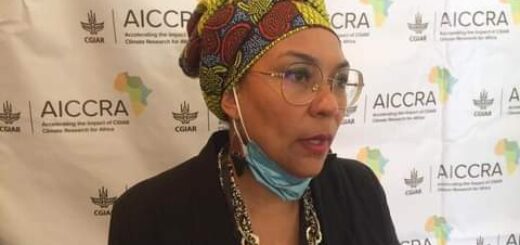Notice: Undefined index: catFilterList in
/home/zambi/public_html/wp-content/plugins/wp-likes/api.php on line
243
Post Views: 1,946
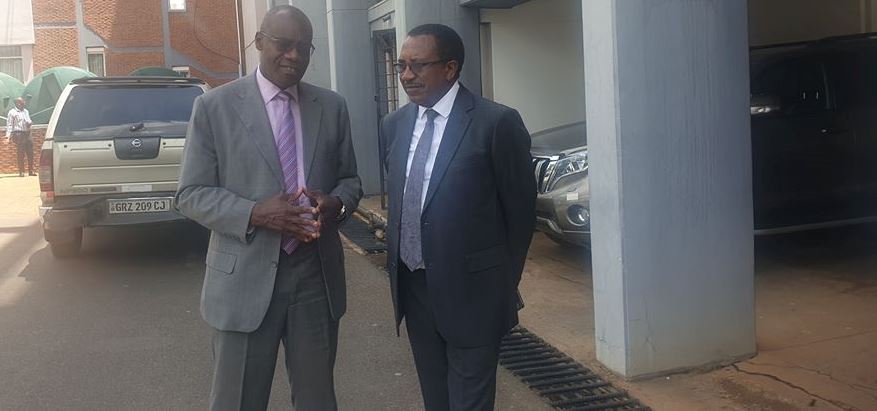
Secretary to the Treasury Fredson Yamba listens to Finance Minister Bwalya Ngandu Thursdat 2nd Jan 2020
Republic of Zambia MINISTRY OF FINANCE MINISTERIAL STATEMENT ON THE STATE OF THE ECONOMY BY HONOURABLE DR. BWALYA K.E NG’ANDU, MP, MINISTER OF FINANCE
Wednesday 12th February 2020
BRIEF ON THE STATE OF THE ECONOMY BY DR. BWALYA K.E NG’ANDU, MP, MINISTER OF FINANCE, FEBRUARY, 2020
1.1 I wish to thank you for joining me and my team for this press briefing.
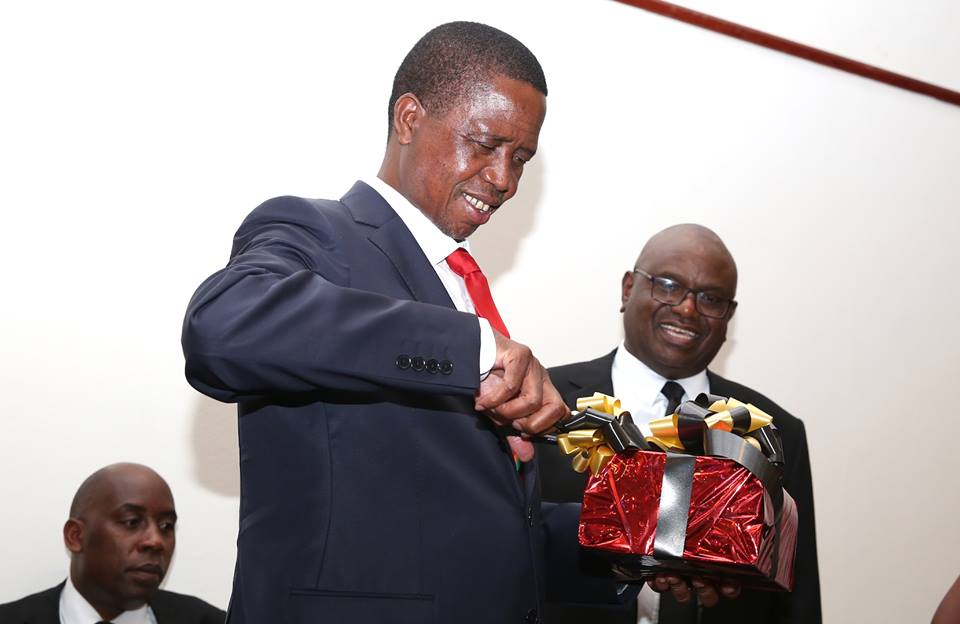
President Edgar Chagwa Lungu launches Justice Patrick Matibini’s ‘Zambian Civil Procedure Commentary and Cases’ book
1.2 We last had this interaction in July 2019. At that time, I highlighted what my priorities would be with respect to economic management and governance. I therefore, wish to provide an update to the nation on how we are faring with respect to the objectives that were set and provide the economic prospects for our nation going forward.
1.3 The year 2020 is the beginning of a new decade and marks exactly ten years before 2030, by which time we aspire to be a prosperous middleincome country and to attain sustainable development goals. We have set a strong base, but we still have significant challenges to overcome. These challenges include low economic growth, high debt levels and income inequality. The Government’s policy framework largely meets the challenges at hand. What we need is effective and sustained policy implementation.
1.4 As a nation, we have made progress in various areas. Our ambitious infrastructure development programme has improved the connectivity of the country. This, however, does not come without cost. The elevated expenditure on infrastructure development has been financed through borrowing and hence the prevailing high debt service payments and stock of debt. Although most of this investment may not result in immediate returns for the country, we are certain that in due course the outcome shall be sustained long-term growth and improved welfare of our people.
1.5 The policy thrust of Government now is to reduce the fiscal deficit, ensure debt sustainability and dismantle arrears. As we do this, we will continue supporting social sector programmes.
2. Developments in the economy in 2019

Barley from local farmers being delivered to Zambian Breweries’ new U$33 million maltings plant in the Lusaka South Multi Facility Economic Zone (MFEZ).
Economic Growth
2.1 The year 2019 was challenging on the economic front. GDP growth was revised down to 2 percent, from an initial projection of 4 percent.
2.2 Following adverse weather conditions, agricultural output and electricity generation are projected to record negative growth. The contraction in the energy sector in turn led to a slowdown in most sectors of the economy including manufacturing, and wholesale and retail trade. Further, liquidity constraints associated with the higher debt service payments and the accumulation of domestic arrears, stifled private sector economic activity.
2.3 In 2019, preliminary estimates indicate that the fiscal deficit, on a cash basis, was 8.2 percent of GDP, against a budget target of 6.5 percent of GDP. This was largely due to higher external debt service payments on account of depreciation of the Kwacha and more than programed spending on capital projects and the Farmer Input Support Programme.

Bank of Zambia Director – Economics, Dr. Francis Chipimo, has been appointed Deputy Governor – Operations – Picture Kalemba
2.4 Total Revenues and Grants collections amounted to K61.3 billion, which was 5.7 percent higher than the target of K58.0 billion. Domestic Revenues amounted to K60.5 billion, and were above target by 7.9 percent. The increase in domestic revenues resulted from a rise in the use of electronic payment platforms and other revenue collection enhancement measures by ZRA. Non-tax revenues at K12.1 billion were above target by 28.7 percent, mostly due to dividend payments.
2.5 Preliminary indications are that Grants amounting to K838.5 million were received against a budget of K1.9 billion. This was due to nondisbursements by some cooperating partners.

The musical Sakala Brothers Levy Sakala and Citizens listen to Finance Minister Bwalya Ng’andu at Lusaka’s Intercontinental Hotel on Wednesday 12th February 2020
2.6 Total Expenditures, including amortization, were above target by 8.7 percent at K94.3 billion against a target of K86.8 billion. The outturn was mostly due to interest payments which at K18 billion, were above target by 27.1 percent against a target of K14.2 billion, due mainly to the depreciation of the Kwacha. Expenditure outlays on the Farmer Input Support Program and capital expenditure were also above target. Personal Emoluments (PE’s) and Use of Goods and Services were below target.
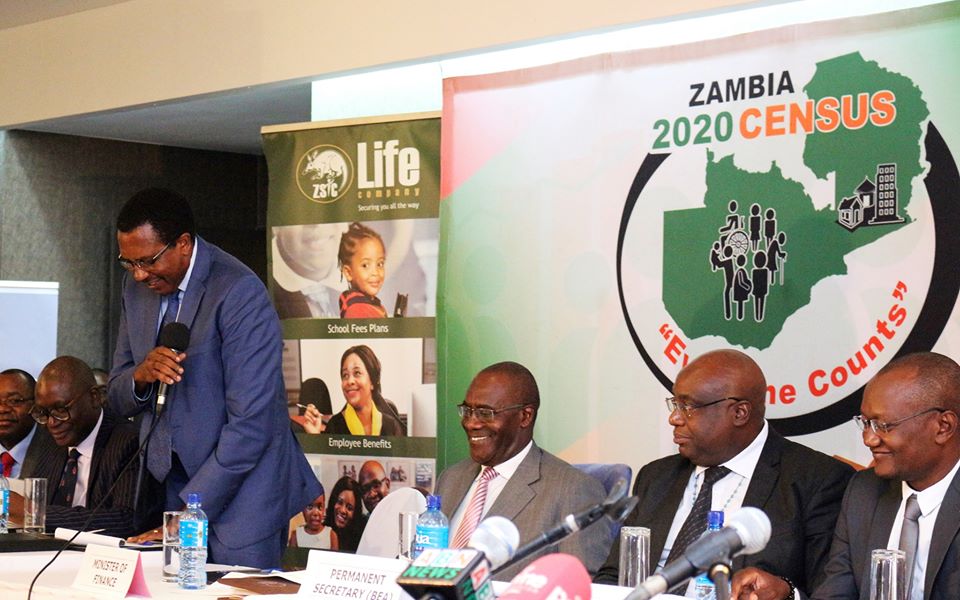
Secretary to the Treasury Fredson Yamba with Finance Minister Bwalya Ng’andu on Wednesday 12th February 2020
Debt Developments
2.7 When I last updated the nation, in July 2019, the stock of external debt at end-June 2019 was US$10.23 billion. The stock has since increased to US$11.2 billion as at end December 2019. This was on account of new disbursements on existing loans mostly earmarked for infrastructure development.
2.8 The stock of Government securities at end-2019 was K80.2 billion from K60.3 billion at end-June 2019. The increase is explained by the issuance of Government securities to finance the budget deficit for 2019.
2.9 The stock of domestic arrears, excluding VAT, amounted to K26.2 billion at end-September 2019 from K20.2 billion at end June 2019.
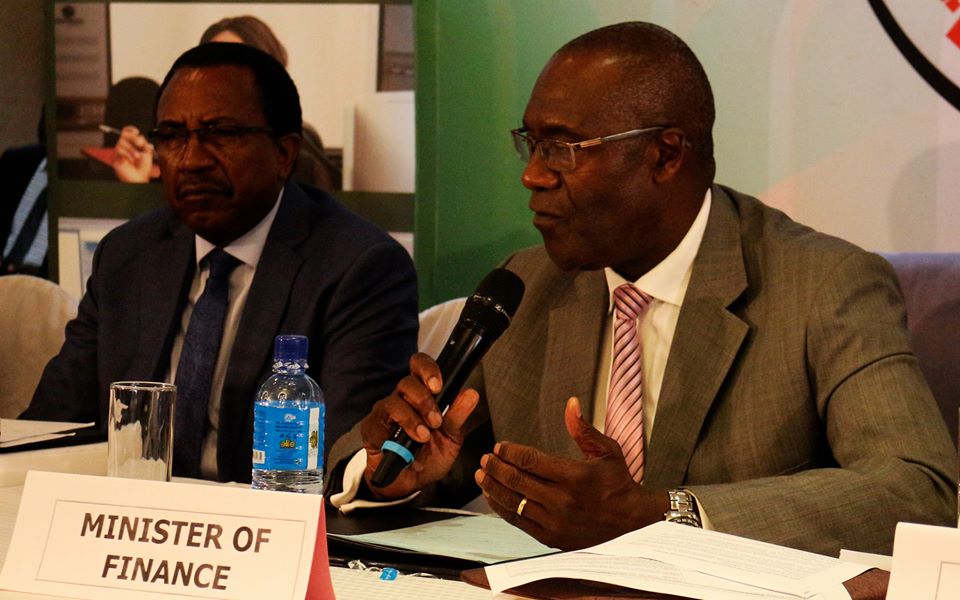
Secretary to the Treasury Fredson Yamba listens to Finance Minister Bwalya Ng’andu address Zambian on the Sate of the Economy on Wednesday 12th February 2020
Monetary, Financial, and External Sector Developments
2.10 The inflation rate at end-December 2019 was recorded at 11.7 percent from 7.9 percent in December 2018. The outturn was outside the target band of 6-8 percent. The increase in inflation reflected a combination of an increase in prices for food items, upward adjustments in fuel prices as well as the pass through from the depreciation of the Kwacha.
2.11 In response, the Bank of Zambia adjusted the monetary policy rate upwards to 11.5 percent in November 2019 from 10.25 percent and the statutory reserve ratio to 9 percent from 5 percent in December 2019.

Atlas Mara Zambia Managing Director, James Koni

Zambian JOURNALIST Francis Lungu with President Edgar Chagwa Lungu and Amos Chanda
Commercial Bank Lending Rates and Financial Sector Conditions
2.12 Commercial banks average lending rates increased to 28.0 percent in December 2019 from 25.4 percent in June 2019. This reflected the rise in the cost of funds and mirrored yield rates on Government securities.
2.13 Generally, the performance of the banking sector continued to be on aggregate, satisfactory. This was reflected in the sector remaining well capitalized and the non-performing loans ratio being below the 10 percent prudential threshold at 9.8 percent in December 2019.
2.14 The overall financial performance and condition of the Non-Bank Financial Institutions sector was fair. Its asset quality was of concern on account of a high level of non-performing loans, which as at 31st December 2019, represented 22.4 percent compared to the prudential limit of 10 percent.
Exchange Rate Developments
2.15 The exchange rate of the Kwacha against major currencies generally depreciated in the third and fourth quarters of 2019. The Kwacha averaged K12.97 and K13.86 per US dollar in quarter three and four, respectively. This was at the back of heightened demand in the market induced by petroleum, electricity and fertilizer imports, amidst reduced supply of foreign exchange.
2.16 Against the British Pound, Euro and South African Rand, the Kwacha depreciated by 7.9 percent, 6.1 percent and 5.6 percent, respectively, between June and December 2019.

a-file-phot-of-a-worker-stacking-copper-plates-at-a-plant-in-zambias-copper
Gross International Reserves
2.17 As at end-December 2019, Gross International Reserves were US $1.45 billion, equivalent to 2.1 months of import cover. The reserves as at end June 2019 were US $1.41 billion, equivalent to 1.6 months of import cover. The increase in reserves is attributed to net purchases of foreign exchange from the market by the Bank of Zambia, and continued payment of mineral royalties in US dollars.
3. Economic Outlook in 2020 and the Medium Term
3.1 Economic growth in 2020 and the medium term is expected to be above 3 percent. Risks to the medium-term growth projection relate to climate change, particularly in the agricultural and energy sectors, ineffective implementation of fiscal consolidation measures and uncertainty in the global economy.
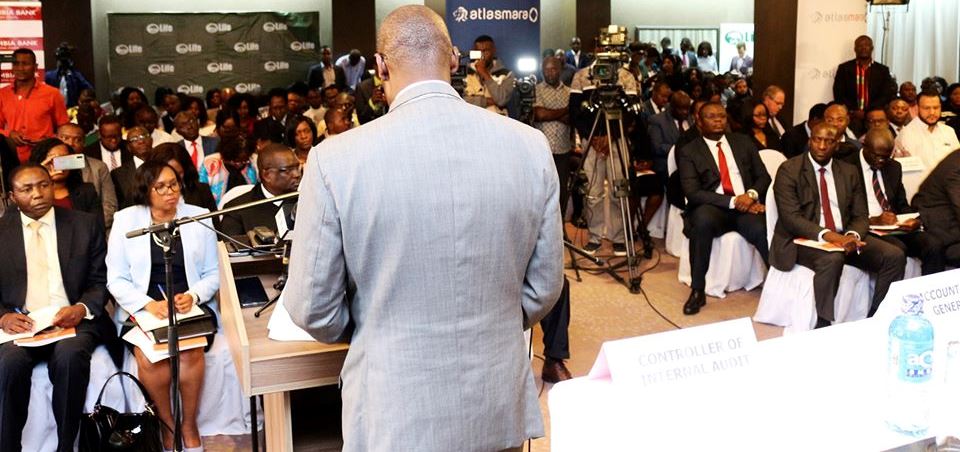
Finance Minister Bwalya Ng’andu addressing Zambia on Wednesday 12th February 2020
3.2 The fiscal deficit is expected to be around the projected 5.5 percent of GDP. This will be on account of measures Government is undertaking to enhance revenue collection as well as to deal with the debt portfolio. The Ministry will also give special focus in 2020 to funding social sectors particularly pensions, social cash transfer and health and education sectors whose allocation in 2019 was not met. Further the Ministry will focus efforts at domestic arrears dismantling.
3.3 Inflation is expected to remain high in the 1st half of the year on account of the pass-through effect of the exchange rate depreciation and the increase in fuel and electricity prices. The rate is expected to start tapering down in the second half of the year due to a reduction in food prices as fresh produce begins coming onto the market.
3.4 Government will continue implementing measures aimed at stabilising and augmenting external reserves. The measures include reducing outlays on debt service, Bank of Zambia purchases of foreign exchange from the market as well as purchases of gold as a reserve asset.
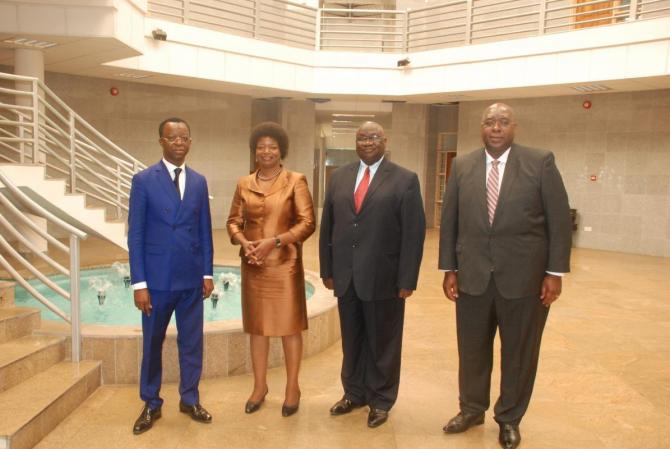 4. Structural and Legal Reforms
4. Structural and Legal Reforms
4.1 Government is aware of the various risks that must be mitigated to improve the economic situation in 2020. The constraints require that we undertake reforms to enhance domestic resource mobilisation, improve the linkage between planning and budgeting, reform the Farmer Input Support Program and implement energy sector reforms.
4.2 To enhance domestic resource mobilisation, Government will step up the modernization and automation of revenue collection processes and provision of Government services through electronic platforms.
4.3 With regard to enhancing the credibility of the planning and budgeting processes, Government has presented the Planning and Budgeting Bill to the National Assembly. Once enacted, the Act will provide for strengthened accountability, oversight and participation mechanisms in the planning and budgeting processes.
4.4 To entrench the credibility of the budget and also avoid wasteful expenditure and over-pricing arising from the weaknesses in the current law, Government is finalizing a new Public Procurement Bill which will be tabled before Parliament during this session of the National Assembly.
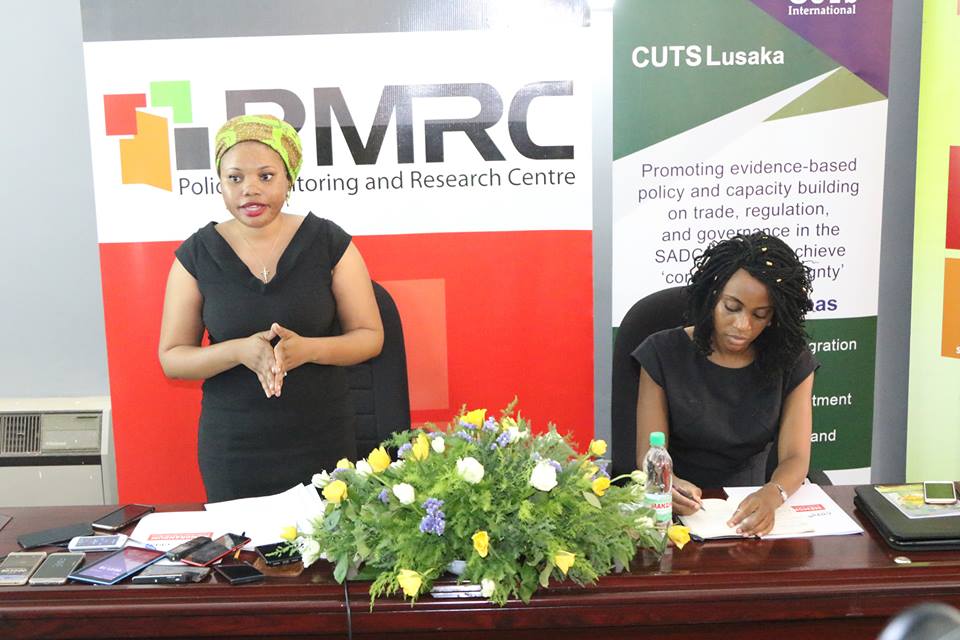
Policy Monitoring and Research Centre (PMRC) Executive Director Bernadette Deka and Consumer Unity and Trust Society International (CUTS) Centre Coordinator Chennai Makumba have signed a Memorandum of Understanding (MOU) for collaboration in Joint Research, Policy Analysis, Information Dissemination and Event Co-Hosting.
Debt Management
4.5 In my address in July 2019, I indicated that the Ministry of Finance would engage different Government ministries in order to agree on projects to be slowed down, re-scoped, canceled or postponed. We proceeded to undertake this process. The outcome of these consultations was a Cabinet memorandum which Cabinet considered on 20th December, 2019. At its meeting, Cabinet directed that the following measures be undertaken:
a) A moratorium on contraction of external project loans;
b) Cancellation of selected external project loans; and
c) Re-scoping of selected externally financed projects in order to reduce the project cost, and ultimately reduce the undisbursed loan balance.
4.6 The moratorium on contraction of external project loans will apply mainly on non-concessional financing. Regarding cancellation of selected external project loans, the external debt portfolio was extensively reviewed and relevant stakeholders engaged to identify and assess already contracted project loans. These were then subjected to a defined criterion in order to determine their suitability for cancellation or re-scoping. The Government is currently reviewing the legal ramifications of undertaking the debt re-profiling exercise and will subsequently engage with lenders and contractors.
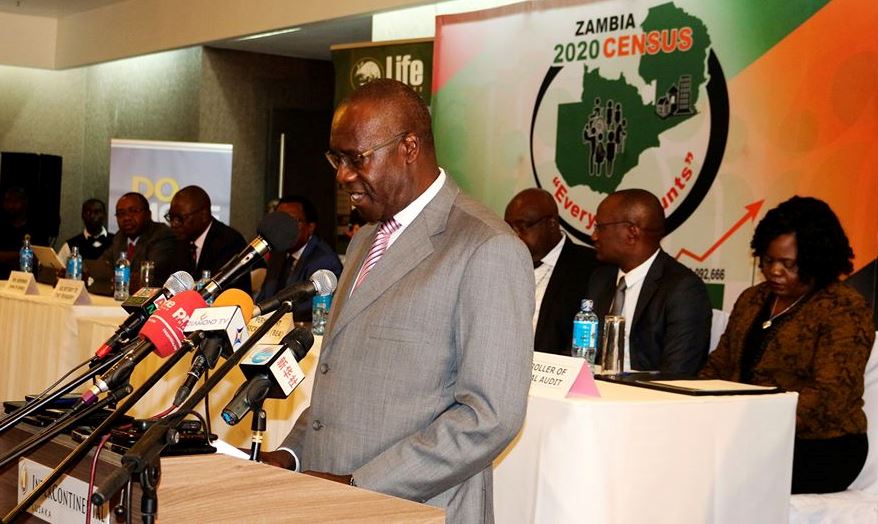
Finance Minister Bwalya Ng’andu addressing Zambia in Lusaka on Wednesday 12th February 2020
4.7 The reduction in the undisbursed debt by cancellation and re-scoping of selected project loans, coupled with the moratorium on project loan contraction, will contain the rise in the debt stock and position the country on a sustainable path. These measures are aimed at reducing the current undisbursed external debt of approximately US $7 billion by about US $5 billion.
4.8 The re-scoping exercise in the road sector will reduce project costs from K10 billion to K1.4 billion.
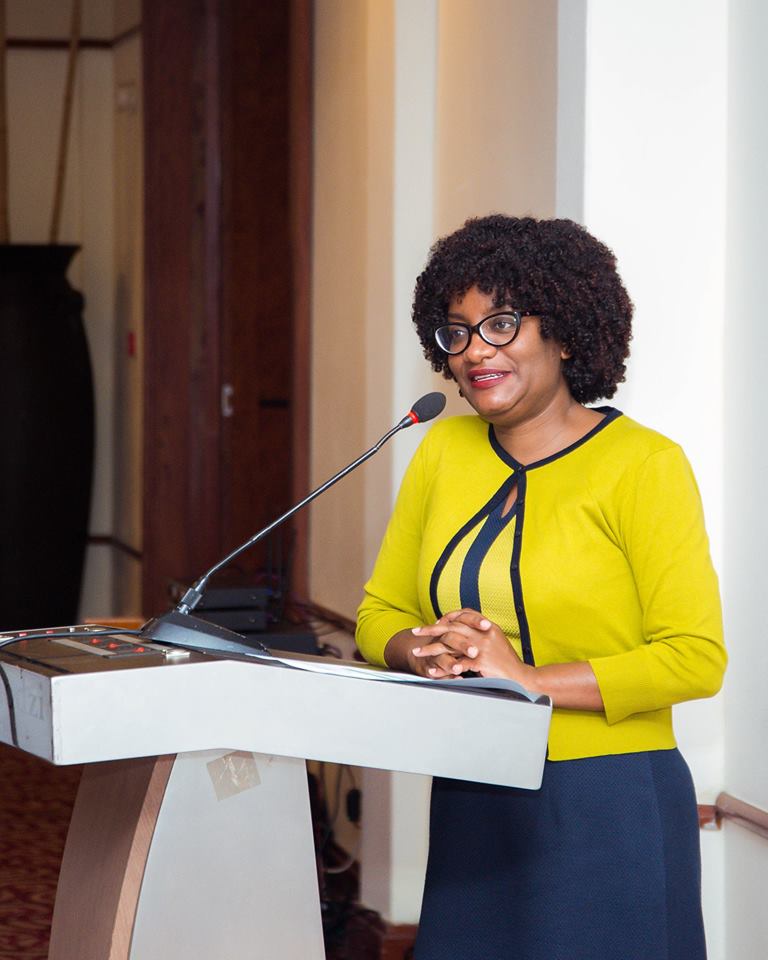
ZIPAR Executive director Dr Pamela Mambwe Nakamba Kabaso

Dr. Bwalya K.E Ng’andu
Arrears Clearance
4.9 To unlock liquidity to the private sector, Government is working towards reducing the stock of arrears to domestic suppliers of goods and services. Between December 2019 and January 2020, the Ministry released a total of K590 million to the National Road Fund Agency and paid out K452 million representing 77 percent of the amount owed to local road contractors and consultants. Almost all the contractors undertaking routine maintenance works were paid in full.
4.10 In order to avoid further accumulation of arrears, Government has, as part of its austerity measures, enhanced its commitment control systems. All erring controlling officers will be held to account in line with the Public Finance Management Act.
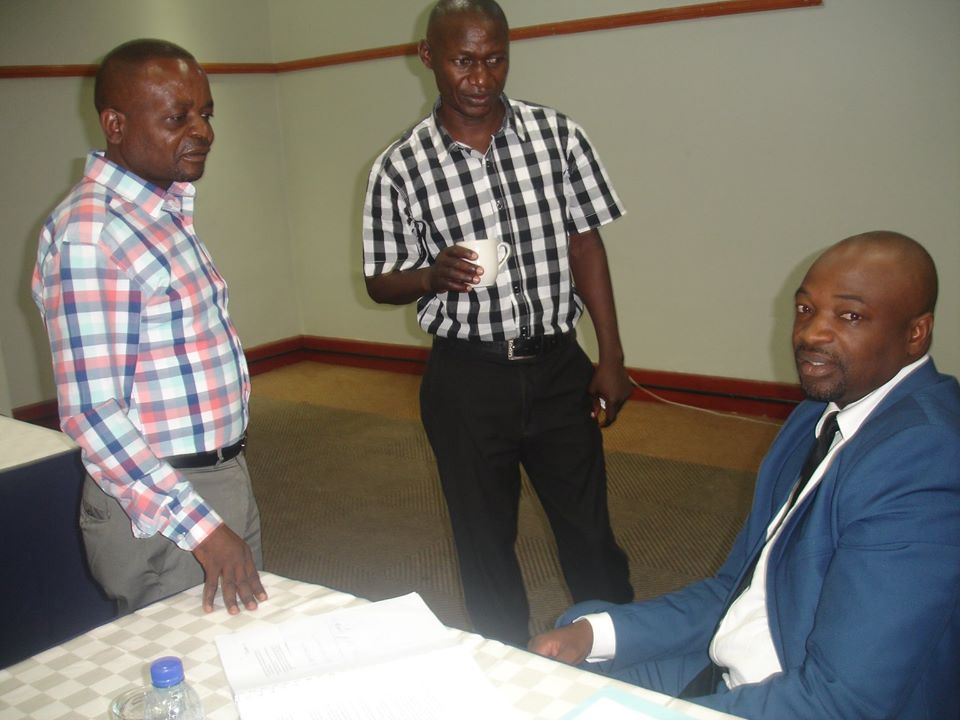
Flashback: ZCSD Executive Director Lewis Mwape, Head of Programmes Bwalya Pascal and UNZA Constitutional Law Lecturer Dr Obrien Kaaba at Cresta Golfview Hotel in Lusaka Derrick Sinjela
Monetary and Financial Sector Policies
4.11 Financial conditions have been tight, in part due to the high fiscal deficit, debt service and the build-up in arrears. This has led to an increase in inflation, credit crunch, and therefore limited resource to spur private sector economic activities. Dismantling of arrears will be prioritized to ease pressure on the financial sector.
4.12 Measures that are being taken to contain the high levels of external debt will further help in augmenting reserve build up and stabilization of the exchange rate of the Kwacha.
5. Engagement With the IMF and Other Cooperating Partners
5.1 The last formal meetings between the Government and the International Monetary Fund were held in Lusaka from 13th to 19th November, 2019. The IMF Mission was in the country at the invitation of Government to discuss recent economic developments and the economic outlook for 2020 and the medium term. Based on the outcome of the mission in November and the debt and fiscal measures I just alluded to, Government will work with the IMF to define a working relationship with them and determine the nature of its support to the Government.
5.2 We have written and advised the Fund of the measures that Government is undertaking to address debt sustainability. The next engagement with the Fund will be held from 18th March to 1st April, 2020.
5.3 Government recognizes the support that we receive from cooperating partners in social and economic sectors such as education, health, energy and agriculture. We will therefore continue our engagement and interaction with cooperating partners as we value their support.
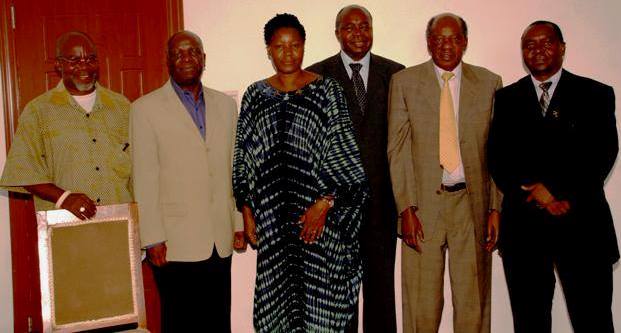
Dr. Katele Kalumba, Ng’andu Peter Magande, Ng’andu Peter Magande, Edith Nawakwi, Dr. Situmbeko Musokotwane, Alexander Bwalya Chikwanda and Rabson Chongo
6. CONCLUSION
6.1 As Government, we will ensure that we implement the debt management measures as directed by Cabinet. We will also enhance revenue collections whilst remaining mindful of the need to support private sector growth. We will continue to engage cooperating partners to support our growth and development agenda.
6.2 Through implementation of the measures that I have outlined, we shall return the country to debt sustainability and get the economy on the path to recovery. The measures and policies are sound and should have the support of the Zambian people. What is required is effective and sustained implementation. We are therefore, all called to action.
 Be the first to like.
Be the first to like.











 4. Structural and Legal Reforms
4. Structural and Legal Reforms 








